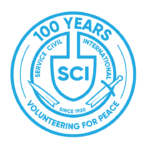Acknowledgments
IVP would like to thank all the wonderful volunteers who have put a lot of time and effort into developing this new publication. Special thanks to Michelle Bastian for developing the concept and content. Other contributors include: Olga Enigk, Jennifer Bleazby, Melissa Cloney, Peter Durant, Shalini Kunahlan, Sharon Craig, Stacey Watson, Richard Hord, Henk Luf, Giovanna Gagliardo, Cybele Shorter, Rita Sofea Warleigh and Jules Andrews.
Some of the content of this guidebook has been published in other SCI publications including: The SCI North/South Training Guide, PVP Seminar Reports, Conflict Resolution: Best Peace Process in SCI, and SCI website as well as the various long-term volunteering guides.
The Guide to International Volunteering is available as a set of web pages by using the menu list on the left hand side of the page, or if you prefer you can download a PDF version of the last print edition produced in 2009 (5.86MB).
Welcome
This is the first edition of A Guide to International Volunteering.
This guidebook will introduce you to the phenomenon of working for peace through the international workcamp movement. It aims to introduce IVP, its vision, goals and history and to prepare you to participate in any of the hundreds of volunteer projects around the world that IVP offers each year.
Inside you’ll find information about workcamps – what they are and what to expect, inter-spersed with stories written by volunteers about their workcamp experiences.
Three sections focus on important skills that will help you get the most out of your project – group dynamics, non-violent conflict resolution and democratic decision-making. Another two sections introduce a variety of perspectives on peace and conflict and global development. These sections will give you some background on the broader issues that lie behind specific IVP projects.
When you volunteer on an IVP project you will be working with people from a variety of countries and may be immersed in a new culture. To help ease the transition we have included a section on cross-cultural understanding. This section will be particularly important for those undertaking their first overseas trip or going into a country with a very different culture. It highlights specific issues that may arise during an IVP project with anecdotes from past volunteers. A brief chapter on environment and sustainability follows.
When you return from your project, you may be interested in becoming further involved with IVP. For example, we offer you the chance to develop important leadership skills through becoming a workcamp leader, to participate in international training, to gain committee experience, to leam newsletter production and obtain additional skills in general office management. These are just some of the exciting areas by which you can gain experience through volunteering with IVP.
We also offer long-term projects for volunteers with previous experience. The section on getting involved goes into this in more detail, including how to apply.
Some important things to think about when planning your participation in short-term workcamps completes this Guide.

